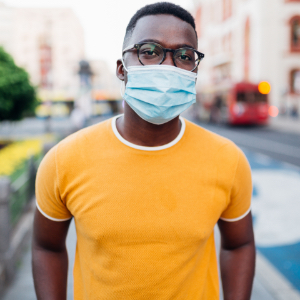Do our vaccines protect against the different COVID-19 variants?

According to the United States Centers for Disease Control and Prevention (CDC), viruses constantly mutate and change, and new viral variants are expected to occur. With Delta, the most prevalent COVID-19 variant in South Africa and many other countries right now, the question remains: do available vaccines protect us against this variant?
At the end of May 2021, the World Health Organization (WHO) assigned letters of the Greek alphabet to COVID-19 virus variants currently in circulation around the world to make them easier for us to talk about and understand. These are all variants of the SARS-CoV-2 virus that causes COVID 19 disease:
- The Alpha variant was first detected in the United Kingdom (UK) in September 2020.
- The Beta variant was first detected in South Africa in May 2020.
- The Gamma variant was first detected in Brazil in November 2020.
- The Delta variant was first detected in India in October 2020.
- Why do variants come about? Read up on how viruses work to find out more.
The WHO currently identifies the above four COVID-19 variants as "variants of concern" (VOC). This means there is evidence that these variants are more transmissible than prior forms of the virus that causes COVID-19, or more virulent, so possibly cause more severe disease (not always the case).
- The Delta Plus variant, also known as B.1.617.2.1 or AY.1, is considered a sub-variant of the Delta variant. It's a VOC in India and some other countries but hasn't been labelled as such by the CDC and WHO.
The WHO also lists four "variants of interest" (VOI) which means they're being carefully monitored:
- B.1.525 (Eta): First identified in multiple countries
- B.1.526 (Iota): First identified in USA
- B.1.617.1 (Kappa): First identified in India
- C.37 (Lambda): First identified in Peru
The lowdown on Delta
The WHO has called Delta the most transmissible of the variants identified so far. Delta is rapidly becoming the dominant SARS-CoV-2 variant globally and is highly prevalent in South Africa, according to Professor Tulio de Oliveira, co-director: KwaZulu-Natal Research Innovation and Sequencing Platform (KRISP).
"Preliminary estimates from genomic data and epidemiological studies suggest that Delta may be significantly more transmissible than other current VOCs, including Beta (30-60% more transmissible)," he says.
"A fast increase in the prevalence of the Delta variant means fast increase of severe illness, hospitalisation and deaths in low vaccine coverage countries such as ours." Prof de Oliveira continues that this "is exactly what we are seeing in our Third Wave of COVID-19 infection which is predominantly driven by the Delta variant."
How are our vaccines holding up to Delta?
New evidence confirms that Delta is well neutralised by vaccines, says Prof de Oliveira. The good news is that both vaccines currently being used in South Africa are offering good protection.
New data on Johnson & Johnson's single-dose COVID-19 vaccine shows that it is 85% effective against severe or critical disease and has demonstrated protection against hospitalisation and death. Indications are also that it may fare even better at protecting against Delta than against the Beta variant - which until recently was the most dominant variant in South Africa. Read more on the Johnson & Johnson's Janssen COVID-19 vaccine overview and safety.
The Pfizer vaccine is also highly effective against Delta despite a recent 'hiccup'. The Israeli government announced that the vaccine's efficacy dropped from 95.3% (in May when the Alpha strain was dominant) to 64% (now that Delta is the most prevalent variant in Israel). But this just refers to protection against infection. When it comes to preventing severe disease, hospitalisation and death, the vaccine remains 93% effective, compared to 97% that was originally reported in The Lancet. Read more on the Pfizer-BioNTech COVID-19 vaccine overview and safety.
Right now, there's much talk about booster jabs, with scientists closely following emerging data to determine whether they'll be needed or not.
For more information on the pandemic, vaccines and registering for your COVID-19 vaccine, visit our COVID-19 vaccine hub today.
Related articles
All medical information found on this website including content, graphics and images, is for education and information objectives only. Discovery publishes content to help to promote a better understand of COVID-19 and COVID-19 vaccinations. The content covered is an overview of key concepts and is not exhaustive in nature. We encourage further reading from other credible sources where necessary.
South African organisations:
- National Department of Health's dedicated COVID-19 portal: https://sacoronavirus.co.za/
- National Institute for Communicable Diseases' (part of the National Health Laboratory Service) dedicated COVID-19 hub
- South African Health Products Regulatory Authority (SAPRHA - part of the National Department of Health).
- South African Medical Research Council (SAMRC)
- South African Medical Journal (SAMJ)
International Organisations:
- Johns Hopkins University
- Harvard Health, Harvard University COVID-19 resource center
- Mayo Clinic COVID-19 resource center
- New England Journal of Medicine (NEMJ)
- US Centers for Disease Control and Prevention (US CDC)
- US Food and Drug Administration (US FDA)
- World Health Organization (WHO)


